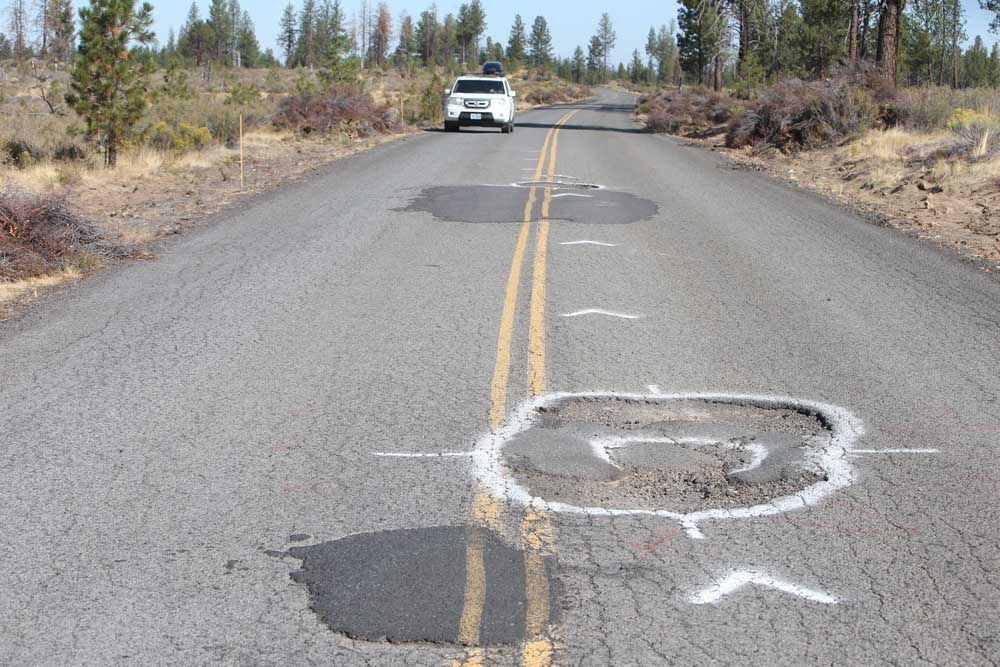Editorial: New fees and taxes may be coming up the road for roads
Published 5:00 am Saturday, November 9, 2024

- A vehicle approaches a section of China Hat Road with several potholes awaiting repair southeast of Bend in September.
One of the big, bad problems Oregon legislators will come back to when they return to Salem next year is the big, bad pothole in the state’s transportation funding.
The Oregon Department of Transportation may face a shortfall of $354 million for 2025-2027.
Trending
What do you think about fuel taxes and vehicle fees going up? A mandatory road user charge that you must pay by the mile? How about a new retail delivery fee per sale for companies that ship and deliver to Oregonians?
Legislators recognized more than 20 years ago there would come a day when relying on a gas tax to pay for road maintenance and operations was going to fall short. The reasons why are even more obvious today — more fuel-efficient vehicles, vehicles that don’t use gasoline and inflation. For instance, if the fuel tax had been keeping up with inflation since 1993, it would be north of 50 cents a gallon, not 40 cents a gallon where it is today. This is more than just an issue for state highway maintenance. Local governments, such as Bend, rely on state highway fund money, too.
New fees and taxes seem to be coming. What will they be?
A place to look for clues may be the state group that has been looking at this question since it was created in 2001, Oregon’s Road User Fee Task Force.
It has some short-term, medium-term and long-term recommendations.
In the short-term, it suggests raising current fuel taxes and vehicle fees to make up for losses due to inflation. It suggests indexing taxes and fees to inflation. It also suggests limiting the preemptions in state law that put limits on what local governments can do for their own transportation revenue.
Trending
That could mean changing the law so local governments could add a local gas tax without a vote. Now what do you think of that? When a local gas tax was put on the ballot in Bend, it was defeated.
In the medium term, the recommendation is to put more resources into Oregon’s road usage charge fee program, called OReGO. People who sign up for that program pay based on how much they drive. People aren’t really signing up. It needs more marketing, more effort to simplify it to encourage people to join. The task force also recommends the state find ways to capture revenue from out-of-state drivers traveling on Oregon roads.
In the long term, the task force recommends Oregonians are going to need to be moved to a road user charge, such as OReGO. The state could start with the most efficient vehicles first and implement it gradually.
A road user charge has problems over the fuel tax. It is more expensive to administer. It’s not as simple as having people pay at the pump. The way it is often implemented is by plugging a device into a car. The device could be removed. There would need to be enforcement and penalties for failing to report driving. An appeals process would need to be established.
Another idea that the Road User Fee Task Force has discussed are retail delivery fees. People are buying more things online, the thinking goes. Tax it. Colorado and Minnesota have already put into place fees on retailers that ship and deliver to their states. It’s 29 cents per sale in Colorado. In Minnesota, it’s 50 cents. There are some exemptions. For instance, some baby products and food and beverage delivery are exempt in Minnesota.
We wonder: If a road user charge was already in place, wouldn’t a retail delivery fee be compelling a consumer to pay extra for something that the business was already paying for?
We don’t know what solutions legislators will favor when they return to Salem.
You should tell them what you think, before they tell you what they are going to do.








